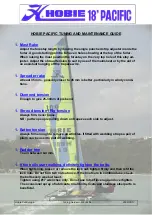
11. MOTOR TYPE, INSTALLATION AND OPERATING
DANGER
NEVER USE MOTOR WITH POWER HIGHER THAN INDICATED,
AND MOTOR WEIGHT HEAVIER THAN INDICATED ON THE
MANUFACTURER'S ID PLATE. IT COULD RESULT IN LOSS OF
CONTROL, AND YOU WOULD BE BREAKING THE LAW
.
6.1. The maximum and recommended powers are listed in the table of technical
specifications. For smaller outboards use the tiller control. For 25HP and up we
strongly suggest to use the steering console with remote system.
6.2. MOTOR SHAFT LENGTH
The motor shaft length must be same as required for your boat (see boat
specifications). Using motors with other shaft length may cause the boat
damage and will void warranty.
6.3. PROPELLER
To choose the optimal propeller your boat and its motor must be tested at sea.
A lower pitch is better for the boat either heavily loaded or used tor water skiing.
A higher pitch will increase the speed potential, when loaded light.
6.4. MOTOR INSTALLATION
Install the motor along the centerline of the boat in the middle on the mounting
plate (1). Fully tighten the clamps (2) and tighten them again after 15 minutes of
running. Secure the motor to the transom with safety cable. All motors are
equipped with a security stop switch lanyard (3). Always use it!
CAUTION
THE BOLTING OF THE MOTOR TO THE TRANSOM IS
SUGGESTED FROM 10HP AND HIGHLY RECOMMENDED
FROM 25 HP AND ABOVE.
The details of the capacity plate are:
1
-
Design category
(European Directive 2013/53/EU ):
Category
C D
Navigation
"Near the shore"
"Protected water"
Wind speed (Beaufort scale)
Until 6 included
Until 4 included
Significant height of wave to
consider (in meters)
Until 2 included
Until 0.5 included
WARNING
BE RESPONSIBLE, TAKE NOTICE OF THESE
PARAMETERS WHEN YOU PLAN YOUR NAVIGATION
PROGRAM, AND DO NOT PUT TO SEA IF THE
CONDITIONS ARE LIKELY TO EXCEED THESE
PARAMETERS.
2
-
MODEL:
Commercial name of the model.
3
-
Maximum number of people authorized on board
(
children) according to ISO and DIN standards.
4
-
Maximum load capacity
of the boat allowed by the manufacturer
and expressed in kilograms and lbs.
5
-
Maximum outboard power
allowed by the manufacturer for the boat
and expressed in kilowatts and lbs.
6
–
Vessel type
by ISO6185 classification.
7
–
Nominal Pressure
of the buoyancy tubes in Bars and Psi. Other
parts of the boat can require different pressures Refer to the INFLATION
chapter of the Owner's Manual Volume 2.
- 8 -
- 9 -
The indications on the capacity plate give information about limitations imposed by
international regulations. Your local regulations can be different. Also these indications
are not a complete list
:
the security requirements (obligatory security equipment of the
boat, maximum authorized distance you can navigate from a shelter, etc. ) may
change according to the country or state.
Always refer to local regulations to be
informed on actuall requirements.




























